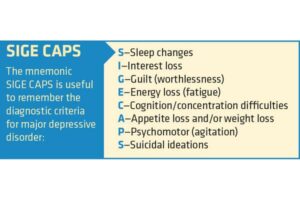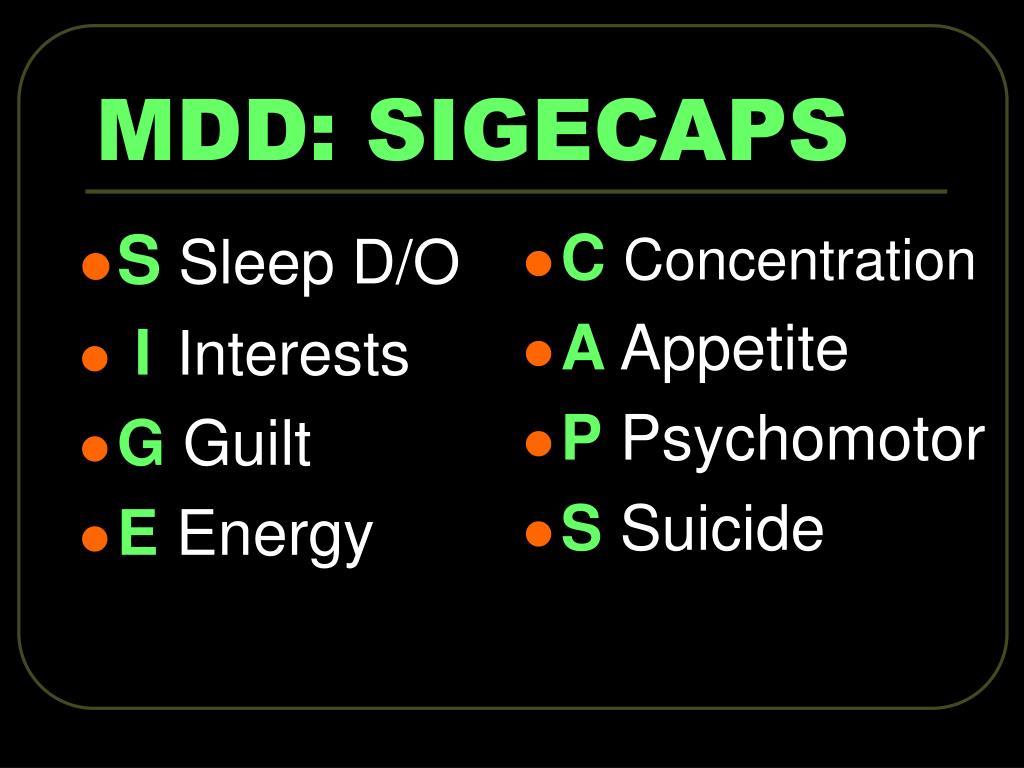Depression is a serious mental illness that affects millions of people every year. While there are many different treatments for depression, it can be tough to know where to start. In this blog post, we will discuss SIGECAPS: a mnemonic device that can help you remember the symptoms of depression. We will also provide information on how to get help if you think you may be suffering from depression.
Contents
What Is SIGECAPS?
 You may have heard of the term “SIGECAPS” before, but what does it actually mean? You may not anticipate it, but it is actually a helpful tool to remember the symptoms of depression. Here is what each letter in SIGECAPS stands for:
You may have heard of the term “SIGECAPS” before, but what does it actually mean? You may not anticipate it, but it is actually a helpful tool to remember the symptoms of depression. Here is what each letter in SIGECAPS stands for:
S– Sleep disturbance (too much or too little)
I– Interest loss (no longer enjoying activities that used to bring happiness)
G– Guilt feelings (excessive amounts of guilt, even when there is no reason to feel guilty)
E– Energy loss (no longer feeling motivated or having the energy to do things)
C– Concentration problems (trouble focusing on tasks or making decisions)
A– Appetite changes (loss of appetite or overeating)
P– Psychomotor retardation or agitation (slowed movements or restlessness)
S– Suicidal thoughts (thinking about harming oneself or taking one’s own life)
As you can see, SIGECAPS is a helpful tool to remember the signs of depression. These signs are listed within the DSM-V, which is the manual that mental health professionals use to diagnose mental disorders.
The purpose of SIGECAPS is to help people identify the symptoms of depression in themselves or others. It is important to remember that not everyone experiences all of the symptoms on this list. Some people may only experience a few, while others may experience many.
How Does SIGECAPS Help In Depression Diagnosis?
Now that we know what SIGECAPS indicates, let us proceed to understand how it helps in diagnosing depression. Depression is diagnosed by a mental health professional based on the individual’s symptoms, thoughts, feelings, and behaviors. However, SIGECAPS provides additional information that can be useful in making an accurate diagnosis.
To get a clearer picture of the diagnostic process, let us take a look at how SIGECAPS is used in diagnosing depression.
There are two main ways in which SIGECAPS is used to diagnose depression.
- The first is through the use of a structured clinical interview. In this type of interview, the mental health professional will ask specific questions about the individual’s symptoms, thoughts, feelings, and behaviors. The answers to these questions will help the professional to determine whether or not the individual meets the criteria for a diagnosis of depression. For example, a psychiatrist or psychologist may ask about the individual’s sleep patterns, appetite, energy levels, concentration, and so on. By doing so, they will be able to get a more comprehensive picture of the individual’s mental state.
- The second way in which SIGECAPS is used to diagnose depression is through the use of self-report measures. These measures are usually questionnaire-based, and they ask the individual to report their own symptoms, thoughts, feelings, and behaviors. The answers to these questions can be very helpful in making a diagnosis of depression. Instantly, if we say that someone has a low energy level, it may not be significant. But if they report that they have no energy whatsoever and can barely get out of bed, then this is a red flag that something may be wrong.
SIGECAPS is a very useful tool in the diagnosis of depression. It can help to provide a more complete picture of the individual’s symptoms, thoughts, feelings, and behaviors. This can be very helpful in making an accurate diagnosis. If you think you or someone you know may be depressed, it is important to seek professional help. A mental health professional will be able to assess the individual and make a diagnosis.
What Are The Other Assessment Tools For Depression?
 It is important to note that SIGECAPS is not used to diagnose depression on its own. Rather, it is one tool that can be used to help in the diagnosis of this condition. A condition as complex as depression can not be diagnosed based on one single assessment tool. In addition to SIGECAPS, mental health professionals will often use other assessment tools to help in the diagnosis. These include the following.
It is important to note that SIGECAPS is not used to diagnose depression on its own. Rather, it is one tool that can be used to help in the diagnosis of this condition. A condition as complex as depression can not be diagnosed based on one single assessment tool. In addition to SIGECAPS, mental health professionals will often use other assessment tools to help in the diagnosis. These include the following.
- The Beck Depression Inventory (BDI) is a commonly used self-report measure. It consists of 21 items, and each item asks the individual to rate their level of depression symptoms on a scale from 0 to
- The Hamilton Depression Rating Scale (HDRS) is another commonly used assessment tool. It is a clinician-administered measure, which means that it is administered by a mental health professional. The HDRS consists of 17 items, and each item asks the individual to rate their level of depression symptoms on a scale from 0 to
- The Zung Self-Rating Depression Scale (SDS) is another self-report measure. It consists of 20 items, and each item asks the individual to rate their level of depression symptoms on a scale from 0 to
These are just some of the assessment tools that mental health professionals use to diagnose depression. As you can see, SIGECAPS is just one tool that can be used in the diagnosis of this condition. If you think you or someone you know may be depressed, it is important to seek professional help. A mental health professional will be able to assess the individual and make a diagnosis.
How To Manage Depression?
After diagnosis and assessment, it becomes an utmost priority to manage depression. The management of depression can take many different forms. It is important to work with a mental health professional to develop a treatment plan that is specifically tailored to the individual’s needs. Some of the most common methods of managing depression include the following.
- Medication: Medication is often used in the treatment of depression. There are many different types of medication that can be used, and it is important to work with a mental health professional to find the right medication for the individual.
- Therapy: Therapy is another common treatment for depression. It can take many different forms, but the goal is always to help the individual understand their condition and learn how to cope with it.
- Self-Care: Self-care is an important part of managing depression. It is important to do things that make you happy and help you relax. This can include things like exercise, relaxation techniques, and spending time with friends and family.
These are just some of the most common methods of managing depression. It is important to work with a mental health professional to see which methods are appropriate for you.
Depression is a serious mental illness that can have a profound effect on an individual’s life. It is important to remember that if you think you or someone you know may be depressed, it is essential to seek professional help as soon as possible.
Conclusion
To conclude the above, we can state that SIGECAPS is a significant tool in diagnosing depression. Depression is a mental illness that can have serious consequences if not managed well. It’s important to remember that if you think you or someone you know may be depressed, it is essential to seek professional help as soon as possible. A mental health professional will be able to assess the individual and make a diagnosis. They will also be able to provide guidance on how to manage the condition.
If you or someone you know is looking for psychological help, Therapy Mantra is here for you. We are the leading providers of online therapy and counseling. Our team of highly trained and experienced therapists can provide assistance at the most affordable rates. Contact us today to learn more about our services. You may also visit our website to book an online therapy session or download our free Android or iOS app for more information.


